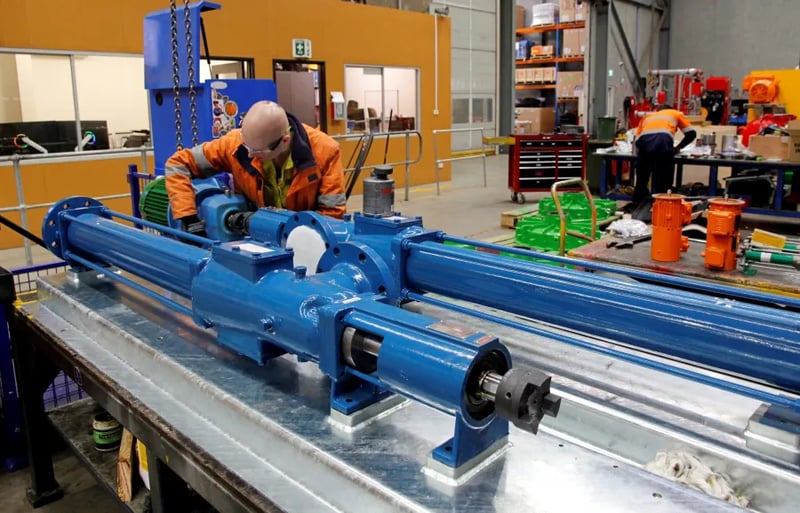
Rotary gear pumps are critical components in many industrial applications, especially in hydraulic and lubrication systems. Their ability to handle viscous fluids with precision and consistency makes them a popular choice across industries such as manufacturing, automotive, and oil and gas. Selecting the right pump and understanding its role can improve system efficiency, reduce maintenance costs, and enhance overall equipment performance.
What Are Rotary Gear Pumps?
Rotary gear pumps are positive displacement pumps that move fluid using the meshing of gears. They typically consist of two or more interlocking gears that rotate inside a pump casing. As the gears turn, fluid is trapped between the teeth and the casing, then transported from the inlet to the outlet under controlled pressure.
Unlike centrifugal pumps, rotary gear pumps provide a constant flow regardless of system pressure, which is essential for precise hydraulic operations and consistent lubrication.
Why Rotary Gear Pumps Are Important in Industrial Systems
Rotary gear pumps offer several advantages that make them indispensable in hydraulic and lubrication systems:
- Consistent Flow: The meshing gears ensure a steady and reliable fluid flow, which is crucial for hydraulic actuators, motors, and lubrication circuits.
- High Pressure Handling: Many rotary gear pumps are designed to operate at high pressures, making them suitable for heavy-duty industrial applications.
- Versatility: These pumps can handle a wide range of fluid viscosities, from thin oils to thicker lubricants.
- Durability: When designed and manufactured by a reputable gear pump manufacturer, rotary gear pumps can withstand harsh industrial environments with minimal wear.
Applications in Hydraulic Systems
Hydraulic systems rely on pressurized fluid to transmit power, control movement, and operate machinery. Rotary gear pumps are often used in these systems because they can provide:
- Precise Flow Control: Accurate movement of hydraulic actuators and cylinders depends on a consistent fluid flow.
- Efficient Pressure Management: The pump maintains steady pressure even under varying operational loads.
- Lubrication of Components: Many hydraulic systems require internal lubrication, which rotary gear pumps can supply simultaneously.
Industries such as automotive manufacturing, construction equipment, and aerospace depend heavily on these pumps to maintain smooth and reliable hydraulic operations.
Applications in Lubrication Systems
Lubrication is essential for reducing friction, heat, and wear in industrial machinery. Rotary gear pumps play a crucial role in delivering lubricants precisely and efficiently:
- Continuous Oil Supply: In high-speed machinery, uninterrupted lubrication is critical to prevent component damage.
- Handling Viscous Lubricants: Rotary gear pumps are capable of pumping thicker oils that might challenge other pump types.
- Controlled Flow Rates: Adjustable flow rates ensure each machine component receives the correct amount of lubricant, improving longevity and performance.
Lubrication systems in factories, power plants, and industrial presses benefit greatly from the reliable operation of rotary gear pumps.
Factors to Consider When Choosing a Rotary Gear Pump
Selecting the right rotary gear pump involves careful evaluation of operational requirements and fluid properties. Key considerations include:
1. Flow Rate and Pressure
Determine the required flow rate and system pressure. Operating a pump beyond its rated capacity can lead to premature wear, leaks, or even mechanical failure. Gear pump manufacturers provide specifications for flow and pressure limits to help guide selection.
2. Fluid Compatibility
The pump material must be compatible with the fluid to prevent corrosion or degradation. Rotary gear pumps are often available in materials like stainless steel, cast iron, and specialized alloys, depending on the type of fluid and operating environment.
3. Temperature Range
Industrial fluids may operate at extreme temperatures. Ensure the pump can withstand both the minimum and maximum temperatures of your system without compromising performance or durability.
4. Efficiency and Energy Consumption
An efficient rotary gear pump reduces energy consumption and operational costs. Pumps with optimized gear designs provide smoother operation, lower heat generation, and reduced wear.
5. Maintenance and Serviceability
Ease of maintenance is critical in industrial environments. Pumps with accessible components, standardized replacement parts, and technical support from the gear pump manufacturer simplify upkeep and reduce downtime.
6. Noise and Vibration
High-quality rotary gear pumps are designed to minimize noise and vibration. In sensitive industrial environments, selecting a pump with low operational noise enhances safety and comfort for operators.
Working with a Gear Pump Manufacturer
A reputable gear pump manufacturer can provide guidance throughout the selection and installation process. They offer:
- Expert Recommendations: Matching the pump to your application’s pressure, flow, and fluid requirements.
- Customization: Providing specialized gear materials, seal types, and configurations for unique industrial needs.
- Technical Support: Assisting with installation, troubleshooting, and maintenance guidance.
Collaborating with an experienced manufacturer ensures your rotary gear pump performs optimally, lasts longer, and reduces costly downtime.
Common Industries Utilizing Rotary Gear Pumps
Rotary gear pumps are used across a wide range of industrial sectors, including:
- Manufacturing: For hydraulic presses, machine tools, and lubrication circuits.
- Automotive: In hydraulic steering, braking systems, and lubrication of assembly line machinery.
- Oil and Gas: For transferring lubricants and fuels under controlled pressure.
- Power Generation: Circulating lubricants in turbines and hydraulic control systems.
- Food Processing: Handling viscous oils and syrups in specialized sanitary pumps.
Understanding the specific operational requirements of each industry helps determine the most suitable pump design.
Rotary gear pumps play a vital role in hydraulic and lubrication systems, providing consistent flow, high pressure handling, and reliable lubrication for industrial machinery. Selecting the right pump involves careful consideration of flow rates, pressure, fluid compatibility, and operational conditions. Partnering with a trusted gear pump manufacturer ensures access to high-quality pumps, expert guidance, and long-term support.
Investing in the proper rotary gear pump enhances system efficiency, reduces maintenance costs, and extends the lifespan of industrial equipment, making it an essential component in any industrial operation.









